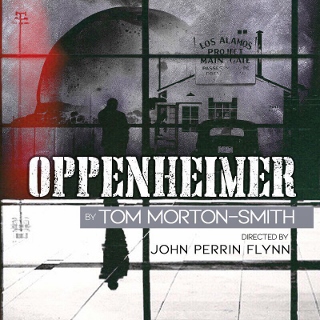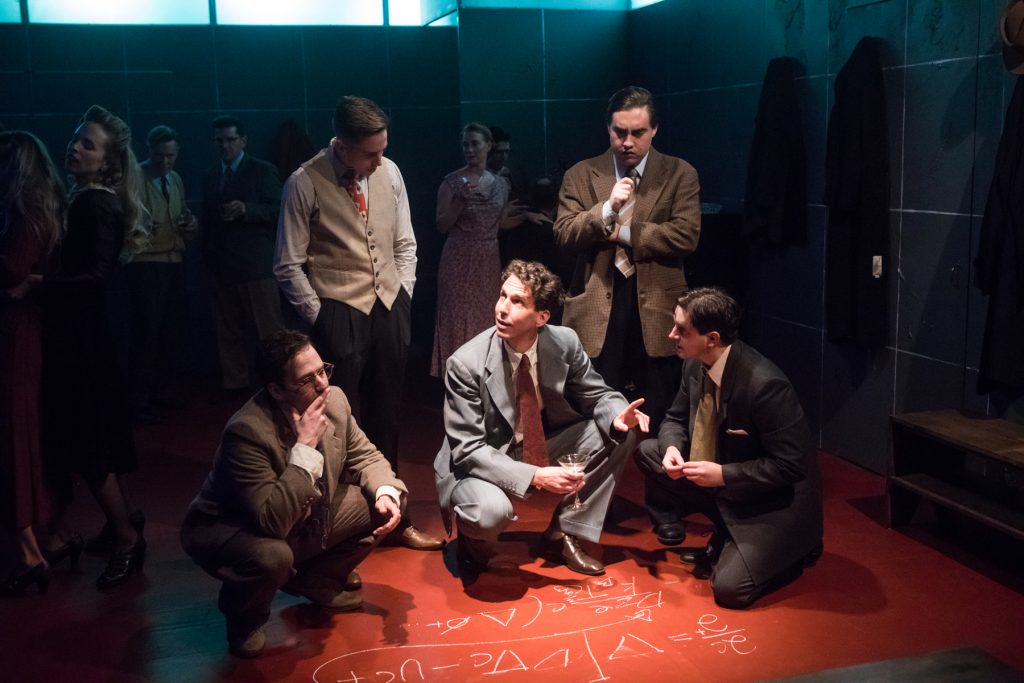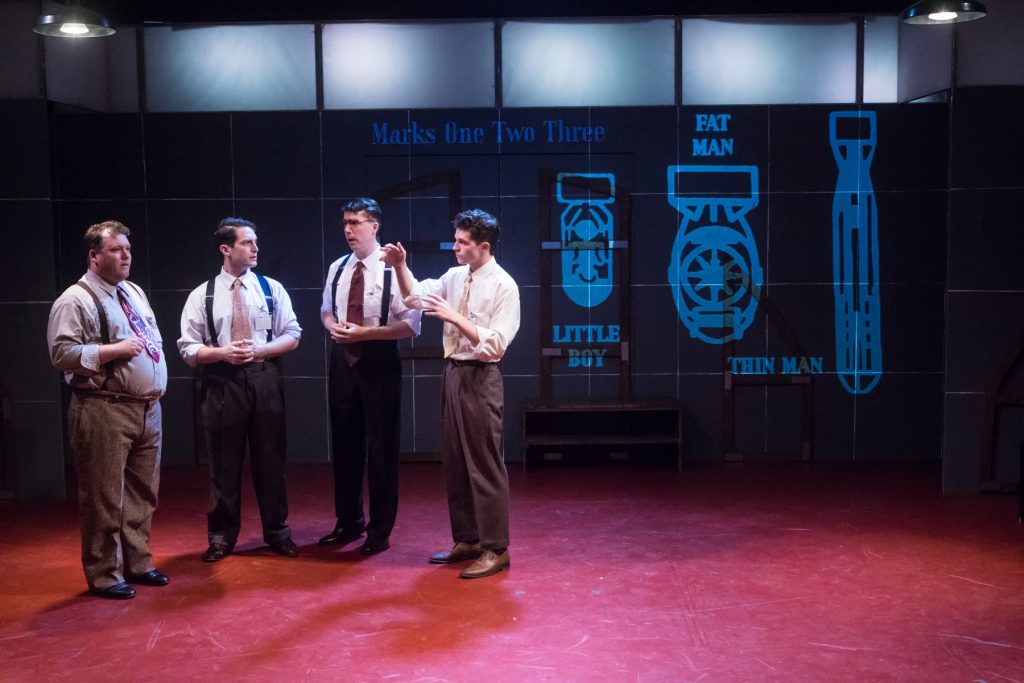PARTNERING ARROGANCE WITH SACRIFICE
In taking residence at the Electric Lodge, their new digs in Venice, Rogue Machine makes an audacious choice with the American premiere of Tom Morton-Smith’s Oppenheimer, first staged by the Royal Shakespeare Company in London. The play takes over three hours, a cast of 24, and multiple physics lessons to tell the story of J. Robert Oppenheimer’s journey from Communist sympathizer to becoming the architect of the bomb that “rips open the veins of God.”
That Artistic Director John Perrin Flynn is willing to take the risk is commendable. That the production succeeds is something of a miracle.
There are four major storylines: How the bomb itself is developed, first from an idea that is possible, then to an idea that is inevitable, and then to a terrible reality; how the heady idealism of American communism is ground into bits, first by Stalin’s show trials and purges, then by wartime patriotism and secrecy; how “pinko” scientists in military housing at Los Alamos are emotionally and intellectually challenged by their task; and last but certainly not least how Oppenheimer’s schizo duality is necessary for his scientific brilliance to flower. He is personally drawn to the chaos of an epically complicated romantic and family life, while ruthlessly and rigidly focused on the invention he believes will end the war, and — indeed in his thinking — end all war forever.
Oppenheimer is arrogant and vain enough to stay the course. He is human enough to weather the many sacrifices along the way, discovering in himself an incredible capacity for loss, with a core of iron, like the center of a planet that has stopped spinning. “I have it within me to murder every soul on the planet,” he says, “Should I not be scared?”
Mr. Morton-Smith’s play follows a linear timeline but is not told with a linear storyline. The action jumps between personal events, science, politics, and war. Everything is always in motion, propelled by the arms race for atomic supremacy against the Nazis and the vicissitudes of Oppenheimer’s love life — his affair with emotionally unstable Jean Tatlock, his marriage to alcoholic, chain-smoking Kitty Harrison, and finally, if tantalizingly elusive, his affair with his own psychiatrist, Ruth Tolman.
He is pragmatic when a friend and fellow supporter of the anti-fascist Spanish forces tries to remain loyal to Stalin, even after the show trials and purges, declaring the atrocities as the invention of conspiring Trotskyites and Capitalists. He doesn’t use the phrase, “fake news” of course, but the idea of such a conspiracy against Stalin is as ridiculous a notion as the national security “deep state” today working hand-in-hand with the left to topple Trump.
James Liebman is terrific as Oppenheimer. He embodies the thrill of the science. As the bomb is finally ready to test, the war in Europe is ending, and Japan might be on the edge of surrender. Will the war be over before the bomb can be utilized? “I hope not,” Oppenheimer responds. Mr. Liebman shows us Oppenheimer’s vanity, but he also believably conveys something deeper, the fear that unless mankind sees the terrible fury of his bomb, it will be used to start another, even more terrible war.
Oppenheimer sacrifices relationships, he betrays the trust of those closest to him, and he survives. Liebman projects that strength, but he also makes Oppenheimer’s breakdown palpably alive. When he curls up in a fetal position on the floor, shaking at the horror of what he has created, you feel his pain.
Kirsten Kollender is vibrant and endearing as the doomed Jean. “You’re not my only man,” she tells “Oppie,” yet is cut to the quick when he tersely tells her she is not his only woman. Ms. Kollender makes us believe that this voracious wraith is also a capable doctor who holds passionately to her Communist principles.
I confess to being a little in love with Rachel Avery as Kitty. Maybe it is just my mordant sense of the world, but I’m always partial to a pregnant woman smoking and drinking. “I smell of baby shit and sick,” she says after the birth of their first child. “No you don’t,” Oppie replies, “You smell of gin and tobacco.” Ms. Avery gives a nuanced performance. She makes Kitty a vital, loyal helpmate to Oppie, while sacrificing none of the character’s biliousness, a woman who thinks nothing of having soldiers care for her babies as she drinks herself into oblivion and spends the day in bed.
Ryan Brophy is spirited and thoughtful as Oppie’s younger brother. When Oppie drops him because of his Communist sympathies, Mr. Brophy is clear-eyed and knowing. The scientists are well-played by a talented ensemble. I was particularly taken with Zachary Grant as Robert Wilson and Mark Jacobson as Bob Serber. Both bring invention and humor to these men, who approach their work with childlike delight but feel trapped and defeated by what they see as their betrayal of liberalism and humanism.
 The third woman in Oppie’s life is given short shrift by Morton-Smith, though psychiatrist Ruth Tolman had a long affair with him during much of his time in Los Alamos. Marwa Bernstein gives hints of the importance that relationship must have had in his life, approaching the role with a combination of understanding and gentle humor.
The third woman in Oppie’s life is given short shrift by Morton-Smith, though psychiatrist Ruth Tolman had a long affair with him during much of his time in Los Alamos. Marwa Bernstein gives hints of the importance that relationship must have had in his life, approaching the role with a combination of understanding and gentle humor.
Director John Perrin Flynn stages the fast-paced scenes well, and he allows the actors the space to explore their characters’ numerous psychological and emotional conflicts. This is a very long play, but it never feels plodding or boring. The party scenes, though, can verge toward false merriment at times, and the pushing and shoving of the scientists grows strained as they demonstrate how protons and neutrons bash into one another as atoms are split. We get it. By the third or fourth time they do it we just want them to stop.
Matt Richter’s lighting design is as on-point as ever — he really is a theatrical treasure in Los Angeles — and sound designer Christopher Moscatiello gets it just right. The only area of the production that fails to shine is Dianne K. Graebner’s costumes. Some of the women are dressed beautifully, if haphazardly in historical terms, but the mens’ suits are generally ill-fitting and few if any are correct for the period. Ms. Graebner is an able designer. I can only assume that demands of time and finances caught her up short in this instance.
 If I’m honest, I’ve grown grouchy about long plays, and am often pleased by the trend toward 80- to 90-minute shows with no intermissions. Maybe modern pacing and the quick cuts of film and television have left us all a bit impatient with anything that takes its time. Oppenheimer is a welcome reminder that sometimes intelligence, complexity, and courage in storytelling demand commitment and surrender from the audience. Bravo.
If I’m honest, I’ve grown grouchy about long plays, and am often pleased by the trend toward 80- to 90-minute shows with no intermissions. Maybe modern pacing and the quick cuts of film and television have left us all a bit impatient with anything that takes its time. Oppenheimer is a welcome reminder that sometimes intelligence, complexity, and courage in storytelling demand commitment and surrender from the audience. Bravo.
Another thought strikes me. It is entirely understandable that Oppenheimer focuses on male characters more than females. To my knowledge, no women were central to the development of the atomic bomb at Los Alamos. Kitty and Jean are given ample stage time here, but there is something about what is being called “the male gaze” at work that I think bears mentioning. We see these female characters not through the eyes of themselves or other women, but from how they appear to men. That isn’t a criticism so much as an observation. Expanding beyond the “male gaze” is part of a process that interests me. I’d love to see someone tackle the story of the women in Oppie’s life. See that? I just did the “male gaze” thing myself — imagining the women in relation to a man. Logical perhaps. But also limiting. And I still want to know more about that shrink in Los Alamos who thinks nothing of sleeping with her patient. There is definitely a story there.
photos by John Perrin Flynn
Oppenheimer
Rogue Machine Theatre
Electric Lodge, 1416 Electric Avenue in Venice
Sat and Mon at 8; Sun at 3 (dark on 10/8, 11/12, 11/17, 11/26, 12/1, 12/2,
12/8, 12/9, 12/10, 12/24; added performances on 10/12, 10/26, 11/2)
ends on December 30, 2018
for tickets, call 855.585.5185 or visit Rogue Machine




